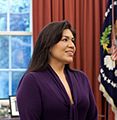Non-voting members of the United States House of Representatives facts for kids
Non-voting members of the United States House of Representatives (called either delegates or resident commissioner, in the case of Puerto Rico) are representatives of their territory in the House of Representatives, but they can't vote on legislation in the full House. However, they are able to take part in certain other House activities. Non-voting members may vote in a House committee they are a member in, and they can introduce legislation. There are currently six non-voting members: a delegate representing the federal district of Washington D.C., a resident commissioner representing Puerto Rico, and one delegate for each of the other four US Territories with people: American Samoa, Guam, the Northern Mariana Islands, and the US Virgin Islands. A seventh delegate, representing the Cherokee Nation, has been formally proposed but not yet seated. Non-voting delegates are elected every two years. The Resident Commissioner of Puerto Rico is elected every four years.
Images for kids
-
Federico Degetau y González of Puerto Rico, The first resident commissioner in the United States Congress
-
Walter E. Fauntroy, delegate from the District of Columbia from 1971 to 1991
-
Choctaw Nation Delegate to Washington Peter Pitchlynn who served as ambassador from 1845 to 1861 and again from 1866 to 1881
-
Cherokee Nation Delegate to Congress Kimberly Teehee







